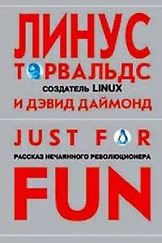Linus Torvalds - Just for Fun
Здесь есть возможность читать онлайн «Linus Torvalds - Just for Fun» весь текст электронной книги совершенно бесплатно (целиком полную версию без сокращений). В некоторых случаях можно слушать аудио, скачать через торрент в формате fb2 и присутствует краткое содержание. Город: NewYork, Год выпуска: 2001, ISBN: 2001, Издательство: HarperCollins Publishers, lnc., Жанр: Программирование, на английском языке. Описание произведения, (предисловие) а так же отзывы посетителей доступны на портале библиотеки ЛибКат.
- Название:Just for Fun
- Автор:
- Издательство:HarperCollins Publishers, lnc.
- Жанр:
- Год:2001
- Город:NewYork
- ISBN:0-06-662072-4
- Рейтинг книги:4 / 5. Голосов: 2
-
Избранное:Добавить в избранное
- Отзывы:
-
Ваша оценка:
- 80
- 1
- 2
- 3
- 4
- 5
Just for Fun: краткое содержание, описание и аннотация
Предлагаем к чтению аннотацию, описание, краткое содержание или предисловие (зависит от того, что написал сам автор книги «Just for Fun»). Если вы не нашли необходимую информацию о книге — напишите в комментариях, мы постараемся отыскать её.
Just for Fun — читать онлайн бесплатно полную книгу (весь текст) целиком
Ниже представлен текст книги, разбитый по страницам. Система сохранения места последней прочитанной страницы, позволяет с удобством читать онлайн бесплатно книгу «Just for Fun», без необходимости каждый раз заново искать на чём Вы остановились. Поставьте закладку, и сможете в любой момент перейти на страницу, на которой закончили чтение.
Интервал:
Закладка:
Of course, I, as an intellectual snob, am convinced that merely throwing resources around is not really all that conducive to true creativity. Just look at the music business of today. Kajillions of dollars are spent every year on finding the next hot artist -- yet nobody really thinks that the Spice Girls (who have been richly rewarded for their contributions to their art) can compare to Wolfgang Amadeus Mozart (who died destitute). So throwing money at the problem does not make for that kind of genius.
But intellectual snobbism -- the you-can't buy-a-genius philosophy -- doesn't really work as a long-term business model. The creative juices are just so unpredictable, so hard to court on finding, that any long-term planning should not concentrate on the promise of pure genius. The technology development of today (and, sadly, the music) depends not on the Einsteins (and Mozarts) but on a huge army of plodding engineers (and, in the case of music, well-endowed young females) who may show only occasional Hashes of brilliance. The added resources do not make for great arc, but for slow and steady progress. And, in the end, this is all to the best.
The notion of plodding engineers may have less romantic appeal than the eccentric-genius approach. Just think about how many "Mad Scientist" movies there are compared to the number of "Plodding Engineer" movies. However, when it comes down to business, you do want your occasional Hashes of genius but, even more than that, you want the steady stream of small improvements over time.
And this is where the power of intellectual property shines: Having grown so lucrative, it has become the holy grail of modern technology companies, feeding this big machine. And thus, thanks to IP protections the steady progress goes on, unhindered. It may not be all that creative any more, but it's dependable.
So I see both sides -- although I have to admit that most of the time I'd rather see a more fun and inspiring world of technology. One where economic factors wouldn't always prevail. I have a dream -- one day IP laws will be dictated by morals, not on who gets the biggest piece of the cake.
Trust me, I understand the economic issues. At the same time, I can't help but wish they did not have such an overwhelmingly negative impact on modern intellectual property law. The economic incentives to strengthen the ownership of intellectual property, and the difficulty in expressing the notion of "fair use" and "morals" in legal text, have caused the two viewpoints on IP to grow further apart. As in a dispute between two neighbors, neither side is willing to even acknowledge that the right solution is likely to be somewhere in between the two extremes.
Clearly, as the unfortunate passing of the DMCA showed, economic incentives are doing well. The question is, what kind of intellectual property law would help drive development while being less driven by crass money-grabbing interests?
The issue is intensified by the fact that modern technology (and the Internet in particular) are weakening many of the traditional forms of intellectual property protection almost faster than we can keep up. And in ways nobody could have predicted. Who would have imagined that Midwestern grandmothers would be pirating needlepoint instructions over the Internet? The ability to copy works of art -- and technology itself -- on a large scale has become so widespread and easily available that institutions with vested IP are running around doing the best they can to shore up their interests. They are doing all they can to make such copying illegal, and introducing new measures to actually outlaw technology that can be used for piracy.
What's wrong with this picture? The problem is that a lot of the new efforts to make it harder to illegally use other people's intellectual property also make it much harder to use other people's work in legal ways. The classic example of this from the Linux world is the so-called DeCSS lawsuit.
In the DeCSS suit, people who were working on technology to decode DVD movies were sued by the entertainment industry for making the code available to others on the Internet. It didn't matter to the judge on the case that the ultimate aim of the project was perfectly legal; the fact that the project could potentially be used for illegal purposes made it illegal in the United States to distribute even the information on where to find the instructions to do the decoding. (The "DeCSS" name itself comes from the project undoing the DVD Content Scrambling System -- CSS. So you "de-CSS" something in order to remove the scrambling so that you can watch the movie on your computer.)
This is a perfect example of intellectual property law being used not to help foster innovation, but to control the marketplace, to control what consumers can and cannot do. It's an example of intellectual property law gone bad.
Such misuses of intellectual property power aren't limited to technology, by the way. Another classic example is the use of trade secret law to prosecute and persecute the people who tried to inform the public about Scientology. The Church of Scientology successfully claimed that their scriptures ("Advanced Technology") fell under trade secret protection, and used IP law to defend them from being made public.
What are the alternatives? Imagine an intellectual property law that actually took other people's rights into account, too. Imagine IP laws that encouraged openness and sharing. Laws that say sure, you can still have your secrets, whether they be technological or religious, but that doesn't mandate legal protection for such secrecy.
Yeah, I know. How unrealistic of me.
An End to Control
The way to survive and flourish is to make the best damn product you can. And if you can't survive and flourish on that, then you shouldn't. If you can't make a good car, then you deserve to go down like the rock that was the U.S. auto industry in the 1970s. Success is about quality and about giving folks what they want.
It's not about trying to control people.
The trouble is, people and companies are too often motivated by pure greed. And that always causes them to lose in the long run. Greed leads to decisions governed by paranoia and a need for total control. Those are bad, short-sighted decisions that end up in disaster, or near disaster. The simple example on everyone's mind has been the phenomenal early success of wireless technology in Europe at the expense of American companies. While the U.S. companies individually tried to control the market by using their own proprietary standards, the European companies rallied around a single standard, GSM, and chose to compete based on which company could produce the best product and provide the best service. The U.S. companies have fallen behind, plagued by their own competing standards. With a market buoyed by a common standard, the European companies have all shared in the boom. That's why kids in Prague were swapping cell-phone text messages years before kids in Peoria had even heard about it as a new way of cheating on tests.
If you try to make money by controlling a resource, you'll eventually find yourself out of business. This is a form of despotism, and history overflows with examples of its ill effects. Say it's the 1800s in the U.S. West and you control the source of water for local farmers. You're stingy with the water and overcharge. At some point, it inevitably becomes profitable for someone else to devise a way to bring it in from somewhere else, and then your market collapses. Or technology advances so that pipes can transport water, from a distance. Either way, as circumstances change your hold gets broken and you're left with nothing. This happens all the time, and it's amazing that people still can't see it coming.
Flash forward to the music industry in the waning years of the twentieth century. The resource it controls is entertainment. A company owns the rights to an artist's work. That artist produces a number of successful singles, but the company puts maybe one or two of those singles on each CD it produces. That way it can sell multiple CDs, instead of the one that everyone wants. Then somebody invents the technology for MP3. Suddenly, music can be downloaded from the Internet. MP3 is about doing the right thing for consumers by giving them a choice.
Читать дальшеИнтервал:
Закладка:
Похожие книги на «Just for Fun»
Представляем Вашему вниманию похожие книги на «Just for Fun» списком для выбора. Мы отобрали схожую по названию и смыслу литературу в надежде предоставить читателям больше вариантов отыскать новые, интересные, ещё непрочитанные произведения.
Обсуждение, отзывы о книге «Just for Fun» и просто собственные мнения читателей. Оставьте ваши комментарии, напишите, что Вы думаете о произведении, его смысле или главных героях. Укажите что конкретно понравилось, а что нет, и почему Вы так считаете.












